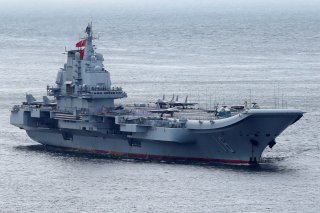Mourning Hong Kong: The Jumbo, the Fujian, and Chinese Power
While America is perceived as divided, distracted, and in decline, tensions are rising in Asia, with increasingly hawkish views coming out of China.
While China celebrates twenty-fifth anniversary of the turnover of the sovereignty of Hong Kong from the British to the Chinese, two very different but symbolic maritime events are making international news.
Hong Kong’s Jumbo Floating Restaurant has been an institution in Aberdeen harbor for over forty-six years. Looming as a floating imperial palace, it attracted locals and tourists alike but closed in 2020 in the wake of the coronavirus pandemic.
On June 14, just two weeks before the twenty-fifth anniversary, it was towed to the high seas, its destination a mystery to all. At least this was the case until it was reported that it had capsized or sunk near the disputed Paracel Islands in the South China Sea as it was being towed en route to Cambodia—China’s most steadfast ally in Southeast Asia.
That the story keeps evolving is a sign of declining transparency in Hong Kong.
This is spawning all sorts of conspiracy theories. Was the Jumbo intentionally sunk? Was it moved out of Hong Kong because of its history in British Hong Kong—a history that China is trying to bury in the textbooks it has recently approved for Hong Kong students?
Then there is the basic right of a free press. Hong Kong’s Foreign Correspondents’ Club (FCC) recently suspended its annual Human Rights Press Awards so as not to “unintentionally” violate any laws, according to a statement from the club president.
The prestigious award has run for more than a quarter of a century and the decision to cancel was due to the introduction of a national security law in 2020 to bring the former British colony into line with the rest of China. Hong Kong was promised a great degree of autonomy and freedoms under a “one country, two systems” agreement in 1997 on its handover from British to Chinese rule.
Though Hong Kong that has sheared off many of its promised freedoms. Regardless, foreign financial companies flock to Hong Kong lured by the riches of managing China’s wealth. Hong Kong’s economic power has also declined sharply as its GDP relative to Mainland China has fallen from 16 percent in 1997 to 3 percent today.
Meanwhile, in Shanghai, China’s third carrier—and the first designed and built at home—was pre-launched. A clear sign of China’s intention to project power throughout the Pacific.
At roughly 80,000 tons, the Fujian betters Britain’s HMS Queen Elizabeth, and is eclipsed by only America’s nuclear-powered supercarriers. It also puts China’s carrier fleet as the second biggest after America’s, which boasts eleven carriers.
The most noteworthy feature of the Fujian is its electromagnetic catapult for launching aircraft. This will allow heavier fighter jets that carry more fuel and weapons, to launch from beyond Asian waters.
The Fujian’s advanced catapult represents a technological leap since the only operational carrier with an electromagnetic catapult is America’s USS Gerald R. Ford, which is yet to be deployed. America’s other carriers use steam-powered catapults, which while proven, are less powerful and flexible.
America clearly has the edge in numbers, experience, and technology but some suspect that China is already working on a nuclear-powered carrier and plans to have four between 2030–2035. This would tilt the balance of power in the Asia-Pacific region.
While China is more likely to use its massive arsenal of missiles to move on Taiwan, the Fujian is an alarming symbol of its sharp rise in power projection. To Chinese hawks, eager to see America pushed from their country’s waters, a foreign-ministry official recently disputed that the Taiwan Strait is international waters and that China has “sovereignty, sovereign rights, and jurisdiction” over the waterway.
The strait is an important thoroughfare for commercial shipping as well as international naval vessels. The latter are mainly American, but in recent years some American allies have also occasionally sailed their warships through the strait.
Bloomberg reports that Chinese military officers, during meetings in recent months with American officials, have repeatedly stated that there are no international waters between China and Taiwan.
Under the UN Convention on the Law of the Sea, which China has ratified and America has not, a country’s sovereignty extends 12 nautical miles beyond its coast. This is followed by about 200 nautical miles of Exclusive Economic Zone (EEZ), under which it has mineral rights but is considered an international waterway. Like most other countries, America treats EEZs as the high seas with freedom of navigation except for rights to fishing and the extraction of minerals. China’s public statements sometimes use language that blurs the difference between sovereign waters and the EEZ.
While America is perceived as divided, distracted, and in decline, tensions are rising in Asia, with increasingly hawkish views coming out of China.
So while the Jumbo sinks alongside Hong Kong’s liberty, President Xi Jinping attends the 25th anniversary of its takeover on July 1 as Hong Kong’s police officially swap British-style marching for the “goose step”. In years past, Hong Kong’s July 1 celebrations would include an annual pro-democracy protest march. That tradition is prohibited under the new national security law.
The U.S. Senate should send a clear signal of America’s resolve to stay a Pacific power and maintain freedom of navigation by boosting spending for the U.S. Navy and approving the Treaty of the Law of the Seas.
Carl T. Delfeld is a senior fellow at the Hay Seward Center for Economic Security, publisher of the Independent Republican, and was a U.S. Representative to the Asian Development Bank. His latest book is Power Rivals: America and China’s Superpower Struggle.
Image: Reuters.

